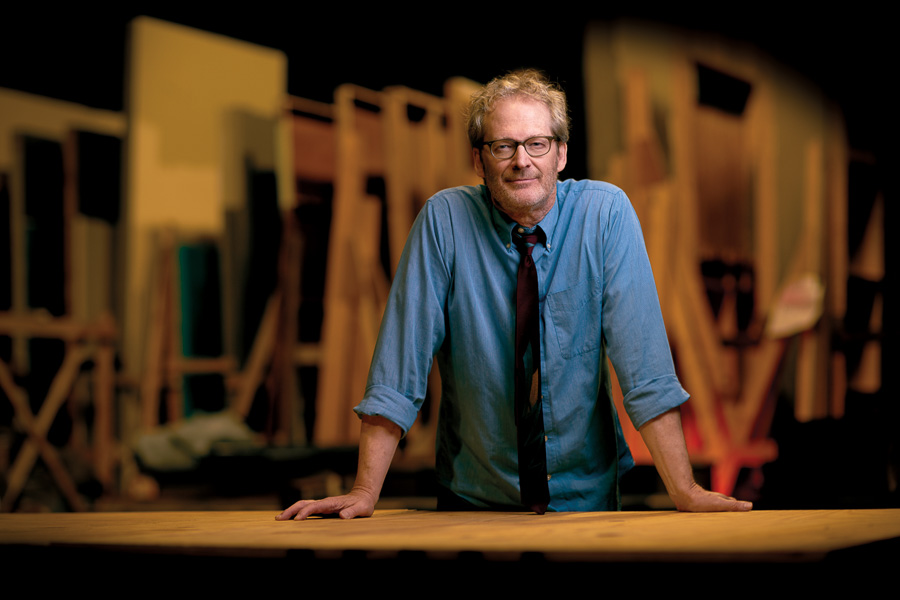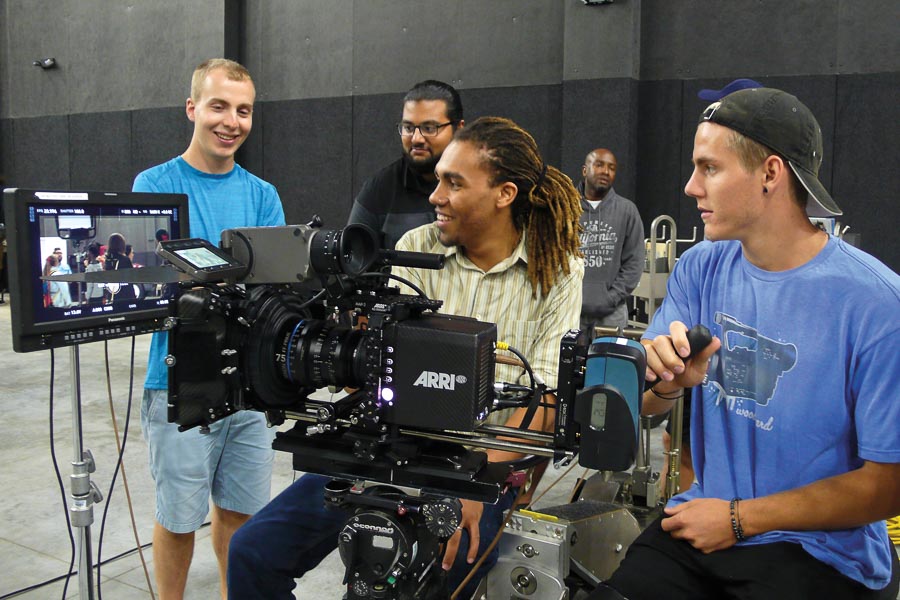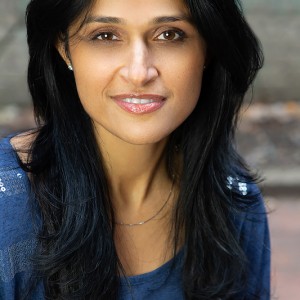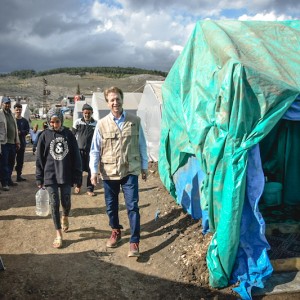As head of Ringling College of Art and Design’s digital filmmaking program, Brad Battersby spends a lot of time behind the camera. This year, Battersby finds himself in the spotlight as Variety named him its Mentor of the Year for 2017. Coming on the heels of the completion of a massive soundstage and post-production facility on campus—spearheaded by Battersby—SRQ checked in with the movie maven on what it means to be a mentor and what he hopes for his students.

PHOTO BY WYATT KOSTYGAN.
What was your first reaction to being selected? Battersby: It was a big surprise. For any school to gain the kind of attention that Ringling has outside of the major metropolitan areas where the film industry resides, it’s huge—and especially for a new program. We’re the newest program on the Hollywood Reporter’s top 25 film schools list. And when you look at all the film schools that are rated, they all have masters programs and we’re the only one with only undergrads. When you look at the competition that way, you realize very quickly we’re almost first, second or third for undergrads.
Why was the commitment Ringling College was making to its film program important to you? When I was looking for a college, if this program had existed I would have jumped all over it. Part of what’s driven me to create this program is the memory of the frustration I had when I was looking for a college. When I tried a few they didn’t work out, and I was very frustrated. I finally gave up and went to theater school; I majored in drama. Theatre has been huge for me, and learning acting technique and being able to work with actors creatively and engage and partner with them has been a godsend—but it wasn’t what I was looking for. I was looking for something production-intensive. I wanted to get my hands wet right away, and get in there and make movies. Ringling, an art and design college that’s created on the bachelor of fine arts model, allows us to deliver four full years of undergrad training. And the beautiful thing is, because we’re small, we do have a bit of an edge in terms of time and engagement with students. We don’t have the huge university sprawl and we don’t want that. We see ourselves as a boutique of film schools, where we can talk and get to know each and every student individually and develop and help them with their own particular voice.

DIGITAL FILM STUDENTS WORKING IN THE NEW FACILITY. PHOTOS COURTESY OF RINGLING COLLEGE OF ART AND DESIGN.
How does it make you feel being named mentor of the year by Variety magazine? I’m an overseer; I’m the big picture guy at Ringling. I teach a couple classes, but, more than that, I see the whole picture and I see the whole individual at the same time. I’m creating an experience for them. I’m setting the atmosphere and the environment for the very best learning experience and opportunities that they can possibly have. That’s going beyond the classroom, and I think that’s what being a mentor is—looking at the whole individual and going outside the confines of a class or meeting. For me at least, that’s how I see the mentor, to have a special relationship and connect with someone who really truly cares and has the ability to help you.
Who are the big mentors in your life? When I went to theatre school, I had an acting teacher, Sheila Weber, and she was from the Neighborhood Playhouse [School of the Meisner Technique]. She was Sanford Meisner’s right-hand teacher—and the Meisner technique is big. I didn’t know any of this at the time. All I knew was that she had been hired from New York and she wasn’t an academic. I was at Stanford, which was highly academic. She was of the earth, the gut. It really threw me and threw all of us. But she got us all to the point where I started watching work in that classroom that was better than anything I had ever seen in any theater, any TV show and movie in my life. These were history majors, math majors. I realized this is what I want more than anything, I want those kind of performances in my movies—that move everybody to absolute tears because you know it’s the truth, you know they’re really engaging in the moment right in front of you, with heart and soul and no separation between the character and who they are. I wanted so bad for myself to be able to do that. I was so into my head, that I actually developed a tic. I didn’t get through an entire scene in class for almost a year, and I was the only one. And I felt really bad about myself. So Sheila paired me with who she called the “best listener.” We started rehearsing and it was like butter, because she authentically listened and it freed me from being self-conscious. Freed me from looking at myself as a director, from the outside. With that, it kind of broke something for me and I was finally able to be in front of people in a scene that was false but totally real in the moment. It was huge. From that point on, I became Sheila’s right-hand person. From that point on, I got through all the scenes.
Why is it critical for a film school to have facilities of such magnitude? It goes back to the philosophy that I’ve had from the first day I came here from Los Angeles, where I had developed my career for the past 20-something years as a writer, director and producer. Film is very practical and it’s tough to teach in a school environment. So the philosophy I came with to Ringling was to try and make the education experience as close to the real world, to what they really need in every discipline, whether it’s editing, producing, writing, directing or cinematography. They’ll do the same thing in school, and they’ll just step across the alleyway to a professional stage. The same kind of studio is there, same equipment, the same processes, the same kind of vocabulary. So the transition from academia to the industry is as seamless as possible. It was always a challenge for me, but the school supported my efforts. Dr. Larry Thompson was my partner in this—he encouraged me and he allowed me to dream that dream so big that here we are nine years later, and we have a fleet of four trucks for an undergrad program. The equipment that we use is being used in the industry. For instance, we taught the RED cameras early on and it became second nature to our students.
How has that paid off for your students? Last year we had a student who graduated and ended up being hired by House of Cards. She’s still with them because she knows the red camera, and of course, David Fincher, who was the first executive producer and directed the first couple episodes, loves the RED camera. We had Anna Paquin and her husband here at one point come and make a movie with us. And then they invited three or four students to the set of True Blood just to observe and they went there and they stayed for a whole week in LA. They came back they said “You know what is amazing? Is they do everything they do here. We didn’t see one piece of equipment that we didn’t use here.” And that’s why my faculty are very much from the industry—they accumulate the kind of experiences that are directly valuable for our students
How will the new soundstage impact the program? Well it’s all part of the endeavor we’re involved with, which is teaching undergrads who maybe haven’t had any professional responsibility in their lives to respect the facility, the equipment—keeping it clean and taking good care of it. When I first came here I had an interview with the students, not only with the administrators. They grilled me, and one of the things they asked me was, “What are you going to do about broken or lost equipment?” It threw me for second, and I said, “There is no such thing as broken or lost equipment in my world, and if I come here there will be nothing broken and nothing lost.” They’re rolling their eyes. I did end up getting that job. I did end up working with those nine students. We did a full semester of production and we must have done four or five short films over the course of three months. At the end, the last day of the last shoot, the woman who asked me that question looked around at everybody and all our stuff and said, “I don’t think we’ve lost or broken anything this whole year!” And everybody applauded. It’s an attitude. It’s an attitude that’s professional, that also goes to the heart of respect. You respect yourself, you respect your own ideas, you respect your art. Nobody else is going to do it more than you. When you respect your art you’re going to respect the tools you make your art with. It’s a very competitive industry and so the finer your tools are and the better shape your tools are in, the better your product is going to be. It might be just slightly better, but you might get that job over another person.
And you think this new complex will do it? With this new building that’s as clean as a whistle, it’s inspiring to be here. It sends a message to the students saying, “We respect you. We respect your potential and what you’re going to do with your art. Now you respect us back, respect the process, respect the space and keep it clean and take care of the equipment.” It’s inspiring to me because I’m so proud of my kids. All these students have gotten that message, and when they go out in the world, I’m incredibly proud of all that they have accomplished and all they will accomplish.









